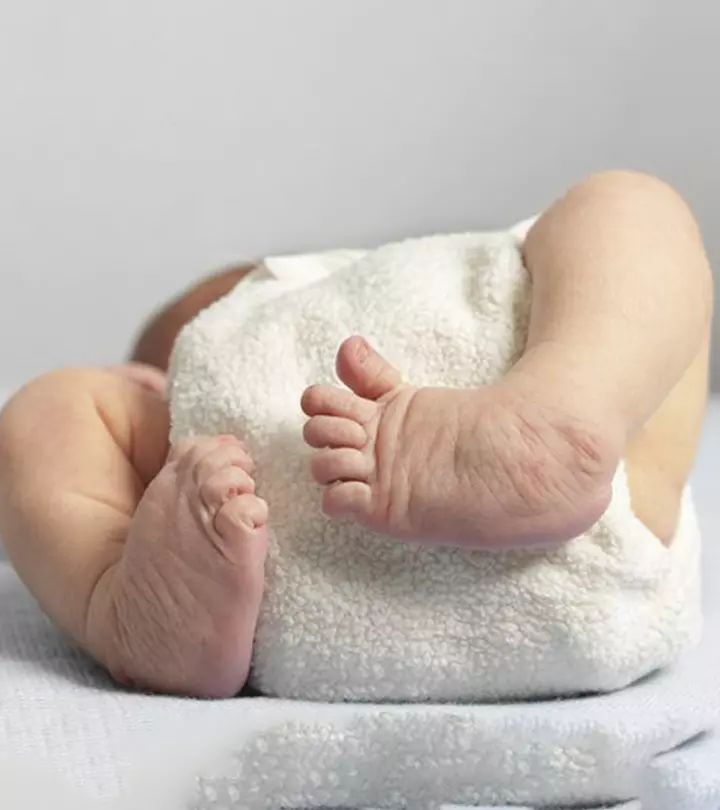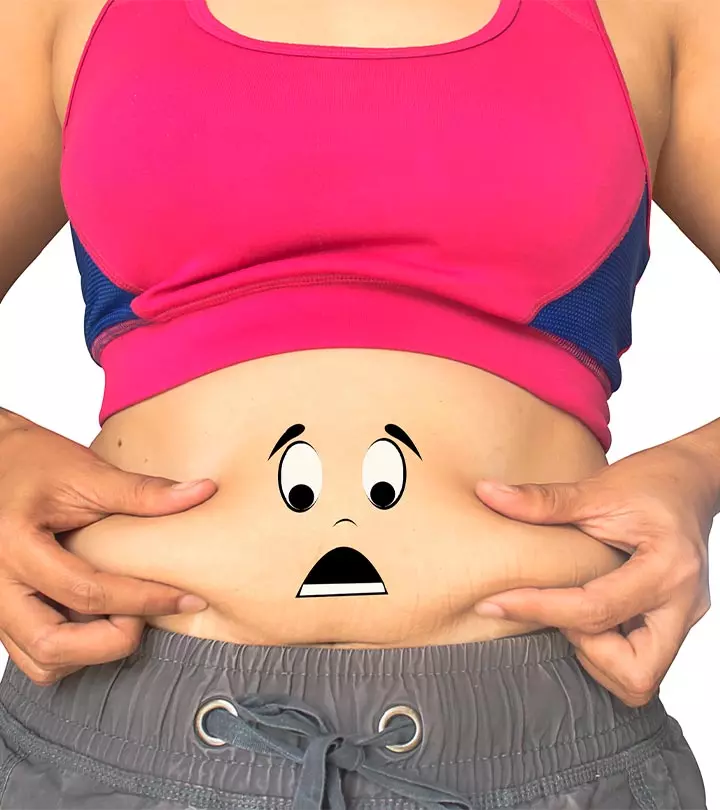

Image: iStock
Sudden Infant Death Syndrome or SIDS is every parent’s worst nightmare. It can occur unexpectedly, and leave you feeling confused, hurt, and depressed. What’s worse is that science can’t tell you why it happens. So, one of the few things you can do is arm yourself with the right knowledge about the condition. Read on to learn more about SIDS, how it affects babies and what you can do about it.
What Is SIDS Or Sudden Infant Death Syndrome?
Sudden infant death syndrome (SIDS) is an unexplained death that usually occurs when your baby sleeps during the night or daytime. It mostly happens in babies whose age lies below one year. The incident typically occurs when your little one sleeps, and thus it is also known as crib or cot death.
The exact cause of the syndrome remains mysterious, but there are certain health abnormalities that lead to SIDS in babies. The abnormalities exist in the portion of your baby’s brain, which normally controls the breathing patterns of your little one.
Research concludes that are several other factors to put your baby at higher risk of SIDS. Parents should take requisite preventive measures to safeguard their little one from Sudden infant death syndrome (SIDS)(1).
Important Facts On SIDS Or Sudden Infant Death Syndrome
Some of the vital facts related to Sudden infant death syndrome (SIDS) in babies are:
- Sudden infant death syndrome usually occurs in an infant younger than one year of age.
- The unexpected death happens during the period of sleep.
- During the first one month of your infant’s life, the risk of SIDS is comparatively low. The risk increase when the infant’s age lies between 2-4 months of age.
- Doctors diagnose all the recognizable causes of infant death including infection, heart or lung diseases, and failure of the central nervous system or sudden trauma. If none of the factors seems to occur, the most probable cause of death is SIDS.
- You can minimize the risk of SIDS by following appropriate precautionary measures. Try to make your infant sleep comfortably on his back. Also, prevent putting any obstructive objects in the sleeping space that interferes with your baby’s normal breathing.
- SIDS imposes no warning signs in infants. The death occurs quickly and suddenly. Mostly when your baby sleeps.
- SIDS is neither contagious nor hereditary.
- SIDS do not impose any pain or suffering in the infant.
- SIDS is a silent and unpredictable medical disorder that can even occur to your healthy infant.
- According to medical statistics, more than 2,000 babies died of SIDS in the year of 2010.
- 60% of the infants dying with SIDS are boys.
- In most of the cases, the incidence of sudden and unexpected death occurs in the winter season.
- Premature babies and newborn babies born with low birth weight are at higher risks of SIDS.
- Babies sleeping on soft mattresses or covered with fluffy blankets are more prone to encounter SIDS during the sleep time.
- Babies born to mother, who smoked during their pregnancy phase, are at higher risks of SIDS.
- Proper breastfeeding technique helps your baby to overcome the risk of SIDS (2).
[ Read: Sleep Positioner ]
Causes Of SIDS Or Sudden Infant Death Syndrome In Babies
There are several physical as well as sleep environmental factors that can lead to SIDS. These factors typically vary from one child to another.
Here we discuss elaborately some of the major causes of SIDS in babies:
Physical Factors
1. Brain Abnormalities:
Some newborn babies are born with brain abnormalities. There are chances to encounter SIDS is probably higher than the others. The brain connection controls breathing and ability to arouse one from a deep sleep. When the brain does not send a signal to perform appropriate functions, the baby experiences SIDS.
2. Respiratory Infection:
When your baby suffers from prolonged cold infection, consult the doctor immediately. Many infants experience SIDS when they suffer from persistent cold, which further contributes to breathing problems.
3. Low Birth Weight:
Premature birth or infants born with poor birth weight are at higher risks to experience SIDS. When your baby is not mature enough, he has less control over his body functioning like breathing or heart rate. As the organs are not well developed, the little one has an increased risk of experiencing SIDS.
[ Read: Sleep Apnea In Babies ]
4. Hyperthermia (Increased Temperature):
Overdressing your little one or wrapping him in excessive coverings elevates his body temperature. The rise of body temperature leads to increase the metabolic rate, and your baby may experience loss of breathing control.
5. Smoking:
If you have been a smoker, or smoke during pregnancy, the chances of your infant suffering from SIDS increase.
Sleep Environmental Factors
The existence of obstructive items in your baby’s crib or his bad sleeping position elevates the risks of SIDS. Let us look at some of sleep patterns to increase risks of SIDS:
- Sleeping on the stomach or side- When your little one sleeps on his stomach or either of the sides, he experiences difficulty breathing. The most comfortable position to sleep in on the back.
- Sleeping on a soft surface- Sleeping on soft mattresses or a fluffy comforter with the face lying down can easily block your infant’s airway. Draping your baby with heavy blankets with his face fully covered is also risky.
- Sleeping with parents- It is better when your baby sleeps in the same room but on a separate bed. When the infant shares the bed with his parents, space becomes congested, and he experiences impaired breathing (3).
[ Read: Premature Baby Sleep ]
Who Is At Greater Risk For SIDS?
Although sudden infant death syndrome can affect a normally healthy baby, researchers did identify several factors that increase a baby’s risk of SIDS.
- Sex-Male babies are more likely to experience SIDS as compared to female ones.
- Age-Infants reaching the age of 2-4 months of their life are at higher risks of SIDS.
- Family history- Babies whose siblings or cousins die from SIDS are at greater risks of such unexpected condition.
- Secondhand smoke-Babies born to smoke addicted mother have a higher risk of SIDS.
- Race-Though the fact is not known, but black, Eskimo and American Indian babies are more likely to develop SIDS.
- Babies sleeping on their stomach can easily experience breathing difficult and SIDS.
- Babies are at higher risks of SISD if their mother faces some of the following factors:
- Took inadequate prenatal care.
- Low weight gain during pregnancy.
- Placental abnormalities.
- Medical History of urinary tract infections or sexually transmitted diseases.
- History of smoking or drug addiction during or after pregnancy.
- Anemia.
- If she becomes pregnant at an age below 20 years (4).
How Does Breastfeeding Help With SIDS Prevention?
Breastfed babies are at lower risks of SIDS as compared to formula fed babies. As breast milk is simple to digest, the tummy gets empty in a shorter span of time and your baby awakes from sleep easily. Formula milk becomes harder for your baby’s tummy to digest, and it makes him sleep for a longer duration. Long and interrupted sleep increases the risks of SIDS in babies. Research concludes that a healthy baby needs to sleep for not more than five hours constantly.
Breast milk also boosts the immune system of your baby, and he can resist disease borne germs. The peak age of SIDS in babies is around 2-6 months of age. At this phase, your baby’s immunity is typically low, and it is important for him to get enough quantity of breast milk. When your baby suffers from stuffy nose and recurrent respiratory tract infections, it indicates about allergy from cow’s milk. Breastfeeding helps your baby to resists from such harmful food allergies and regulates the breathing process. Breastfeeding infants possess higher levels of the hormone progesterone, which further stimulates breathing. So it can be concluded that breastfeeding reduces risks of respiratory and gastrointestinal infections in babies. They can effectively stay protected from the risk of SIDS (5).
Different Ways Breastfeeding Can Help Prevent SIDS In Babies
Here are some effective ways by which breastfeeding helps your little one to overcome the risk of SIDS:
1. Breastfeeding Reduces Reflux:
Breastfeeding helps your little one overcome the risk of SIDS by reducing his reflux effectively. Babies who have reflux possess higher tendency to spit up the food or choke while feeding. Breastfeeding your baby in an accurate posture helps her to swallow the milk and not experience SIDS.
2. Breast Milk Improves Breathing:
Breast milk helps your baby fight against respiratory infections that can easily block the breathing airways and induce severe suffocation. When your baby drinks formula milk, the allergens in the milk tends to block the air passages and makes it harder for your baby to breathe smoothly. Moreover, if the formula milk enters the wrong pipe and reaches up to the lungs it also causes severe irritation that never occurs in breast milk.
3. Breast Milk Fights Infections:
Breastfeeding helps in boosting your baby’s immune system, and he can effectively fight against harmful germs. One of the biggest contributing factors to lead SIDS is respiratory and gastrointestinal infections. With regular intake of breast milk, your baby remains protected from such infections.
4. Breastfeeding Trains Baby To Swallow Food:
During the process of breastfeeding your baby learns to use all the muscles in the jaw, throat and neck. Sucking of breast milk teaches your adorable child to swallow and breathe in a proper coordination. Breastfeeding also strengthens the muscles and keeps the breathing airways open. It is one of the vital reasons for which breastfeeding helps the baby remain protected from risks of SIDS.
5. Breast Milk Is A Power Food:
Breast milk serves as power food and boosts the IQ level of your little infant. His brain development occurs at a constant pace, and it helps your baby to grow both mentally and physically. When the baby remains healthier, he is at lower risks of SIDS.
6. Breastfeeding Helps A Mother Bond With Her Baby:
For the first six months of your baby’ life, doctors advice to breastfed the little one. Breastfeeding helps in the establishment of stronger bonding between the mother and her offspring.
Diagnosing Sudden Infant Death Syndrome In Babies
Sudden Infant Death Syndrome is unpredictable. The unexpected tragedy occurs suddenly, and there are no early signs of distress or significant illness.
- In SIDS, the unexpected event of death occurs suddenly when the infant is in his sleep.
- It is a silent event, and the baby does not even cry or experience painful symptoms.
- A healthy baby can also experience SIDS during his early childhood days.
- The baby usually appears healthy, well developed and well nourished.
- Minor upper respiratory or gastrointestinal symptoms such as a respiratory syncytial virus (RSV) are some of the triggering factors of breathing disorders in the baby.
Sudden, unexpected infant death (SUID) describes the circumstance of an infant death. Doctors diagnose the related causes of SIDS by conducting a couple of forensic tests and procedures. The diagnosis identifies the recognizable causes of sudden death in infants.
Some of the major investigations that aids in the determination of an SIDS death are:
1. Postmortem Lab Tests:
Postmortem test helps to identify the leading factors of death such as the existence of bacterial or viral cultures, severe dehydration, respiratory infections, electrolyte imbalance and any more.
2. Autopsy:
An autopsy provides helpful clues that help in the determination of the death causes. In most of the cases, SIDS occurs due to abnormalities of the brain, malfunctioning of the central nervous system or infections in the heart or lungs.
3. Investigation:
With a thorough investigation of the death scene, it becomes easier to find the exact reason of the victim baby’s death. The investigators interrogate the parents, caregiver, and other family members and collect information. The detailed investigation helps in revealing the recognizable cause of death. A detailed investigation helps in identifying some of the potential factors like soft mattresses, objects to obstruct an infant’s airway and many other relevant factors.
4. Review Family Case History:
Getting, detailed information about the baby’s family medical history, is also helpful n determining the cause of your baby’s death (6).
Minimizing The Risk Of Sudden Infant Death Syndrome Or SIDS
Though there exist no guaranteed ways to prevent SIDS in babies, parents need to adopt few protective measures to reduce the risk of the unexpected incident.
Follow the effective tips and minimize risks of SIDS:
1. Put The Sleeping Baby On His Back:
- Your baby is at greater risks of SIDS when he sleeps on his side or stomach. During such sleeping position, your baby’s face stuck into the mattress firmly, and he cannot breathe easily.
- Make sure your baby’s head is uncovered, and it is better to lay your sleeping baby on his back. It helps him to breathe more comfortably.
- Also, advise the babysitters or child care personnel not to use the stomach position to lay your little one into his crib or baby cot.
2. Keep The Crib Clutter-Free And Clean:
- Place a firm mattress into your baby’s crib, so that he can sleep with a great comfort.
- Avoid putting obstructive things like playing toys, fluffy padding, or thick quilt in the cot.
- Do not leave stuffed toys or pillows in your baby’s crib, as it interferes with breathing when your baby’s face presses against these objects.
- Keep your baby’s crib bare and let your adorable baby sleep with good comfort.
3. Avoid Overheating Your Baby:
- It is advisable to use a sleep sack or light weighted blankets to keep your baby warm.
- Do not use any extra coverings or cover your baby’s face when he sleeps.
- When you cover your growing baby with fluffy blankets, your infant makes a lot of unconscious movements, and the blanket can suffocate him.
- Choose small-sized blankets and tuck them into the foot of the mattress, so that it covers up to your baby’s shoulders.
- Swaddling, or wrapping your baby with fluffy and thick coverings makes your baby feel uncomfortable and makes it difficult to breathe.
- An overheated baby tends to feel restless and cannot bear the body temperature for a long span of time.
4. Breastfeeding Is Highly Advisable:
- Breastfeeding boosts the immune system of your baby and keeps him protected from respiratory tract infections.
- It is advisable to breastfeed you baby for at least six months, which effectively lowers the risk of SIDS.
5. Offer A Pacifier:
- Sucking on a pacifier during the bedtime or naptime effectively eliminates the risks of SIDS.
- For a breastfeeding baby, wait to offer the pacifier until your baby reaches to the age of 3 to 4 weeks old. During such phase, the baby becomes habituated to the effective nursing routine.
- But if your little one is not at interested in the pacifier, never force him.
- Put the pacifier into your little one’s mouth before nap-time. But don’t put it back in his mouth after he falls asleep.
- Keep the pacifier clean and prevent entry of harmful germs in your baby’s body. If the nipple gets eroded, buy a new nipple to replace the old one.
- Never coat the pacifier with honey, alcohol or other substances as it chokes your baby easily.
6. Don’t Smoke Around Your Little One:
- Smoker parents need to give up their addiction before and after their baby’s birth.
- Passive smoking often suffocates your little one, and he experiences the unexpected situation of SIDS.
- Mother addicted to smoking should give up their habit during the phase of pregnancy. Babies born to smoking mothers are at greater risks of SIDS.
7. Make Your Baby Sleep On A Firm Surface:
- Always make your baby sleep on a firm sleeping surface.
- Avoid putting your baby sleep on the sofa, between cushions or waterbed.
- Try to cover the crib mattress with a fitted sheet.
- When your baby falls asleep in swing or carrier, try to put him on the firm sleep surface as soon as possible.
8. Prenatal Care:
- Early and regular prenatal care effectively helps in reducing risks of SIDS in your newborn infant.
- Take a well-balanced diet and avoid the use of alcohols or smoke during the delicate phase of pregnancy.
- You should go for frequent medical checkups during the entire pregnancy period. It helps in early diagnosis of any abnormalities of the growing fetus. Brain abnormalities often lead to SIDS in your newborn offspring.
- A regular medical checkup also reduces the risk of giving birth to premature or low birth weight baby. In both the scenarios, the risk of SIDS is higher.
9. Pediatric Health Care And Immunizations:
- When your baby seems sick or suffers from breathing disorders, call the doctor immediately.
- As a responsible parent, you should take your newborn baby for regular health checkups and routine immunizations. The immunizations keep him protected from harmful and life-threatening diseases.
- Research concludes that vaccinating baby in mentioned time frame lowers the risk for SIDS.
- When your baby meets with the unavoidable incident where he stops breathing and turns blue or limp, take him to the doctor immediately. The medical practitioner examines the health impairments and adopts requisite treatment procedures.
10. Avoid Using Home Monitors:
- Avoid using commercial devices or cardiorespiratory monitors for your baby. Some of such devices include wedges, positioners, and special mattresses.
- The breath monitoring devices are never helpful in preventing SIDS (7).
- Doctors advise usage of breathing monitors for babies who have already gone through severe episodes of breathing issues or premature babies with apnea.
- It is important to create a lot of awareness amongst the doting parents who are still not aware of the preventive methods to reduce the risks of SIDS. With proper precautionary measures, they can safeguard their little one from suffocation. Use the following precautionary measures to ensure that your baby is protected from SIDS virtually all the time.
Did you adopt any measures to protect your infant from the risk of SIDS in babies? Were those measures helpful? Share your ideas with other mommies here. Don’t forget to comment in the box below.
Community Experiences
Join the conversation and become a part of our nurturing community! Share your stories, experiences, and insights to connect with fellow parents.
Read full bio of Ria Saha















